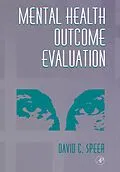Mental Health Outcome Evaluation bridges the gap between traditional research and evaluation methods by presenting an alternative to the highly technical and statistical methods developed in the laboratory for mental health care professionals. It focuses on outcome evaluation of mental health services for adults, concentrating on the general principles that can be used to assess the service effectiveness of community health centers, clinics, and private practices. The book presents a formidable argument for descriptive outcome studies through its evaluation of the results and consequences of care and treatment as well as clinician ratings. It is written in a non-technical style, making it accessible to anyone in the mental health industry. - Addresses industry efforts to monitor and assess information about results and consequences of mental health care and treatment - Evaluates use of clinician ratings as outcome information - Offers accessible general principles for managers and mental health services researchers - Presents the best argument for descriptive outcome studies
Autorentext
David Speer (Ph.D., University of Minnesota) is an associate professor and clinical research psychologist at the Florida Mental Health Institute at the University of South Florida in Tampa. His duties include consultation, education, and training services to the public mental health system for older adults, grant writing, and clinical research. Before coming to Tampa, Dr. Speer was a Post Doctoral Fellow at the University of Notre Dame from 1986 to 1988 and was an executive director of the Northeastern Center (a CMHC) in Kendallville, Indiana from 1982 to 1986. He has also served in executive positions at the Quinco Consulting Center in Columbus, Indiana and the Erie County Suicide Prevention and Crisis Services in Buffalo, New York. He has authored or co-authored 45 journal publications and is the editor of Nonverbal Communication, Sage (1972).
Klappentext
Mental Health Outcome Evaluation bridges the gap between traditional research and evaluation methods by presenting an alternative to the highly technical and statistical methods developed in the laboratory for mental health care professionals. It focuses on outcome evaluation of mental health services for adults, concentrating on the general principles that can be used to assess the service effectiveness of community health centers, clinics, and private practices. The book presents a formidable argument for descriptive outcome studies through its evaluation of the results and consequences of care and treatment as well as clinician ratings. It is written in a non-technical style, making it accessible to anyone in the mental health industry.
- Addresses industry efforts to monitor and assess information about results and consequences of mental health care and treatment
- Evaluates use of clinician ratings as outcome information
- Offers accessible general principles for managers and mental health services researchers
- Presents the best argument for descriptive outcome studies
Inhalt
Why Evaluate Mental Health Service Outcomes?
A Different Perspective: Practical Outcome Evaluation
So, How Do We Tell if Something Works?
What Should Be Measured? Issues
What Should Be Measured? Instruments
Potential Booby Traps and Landmines
Practical Implementation Issues and Suggestions
In Conclusion, Shouldn't Everybody Evaluate Outcomes? (and Other Loose Ends)
